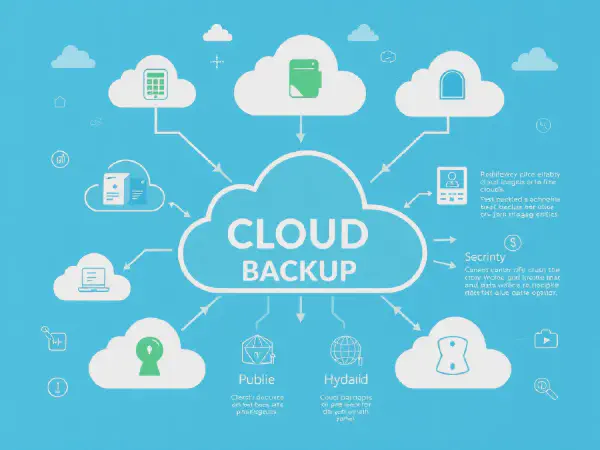The Benefits, Types, Providers, Considerations, and Best Practices of Cloud Back-up

The Benefits, Types, Providers, Considerations, and Best Practices of Cloud Back-up
In today's digital age, data is the lifeblood of businesses. Whether it's customer information, financial records, or intellectual property, losing critical data can be devastating. That's where cloud backup comes in. Cloud backup refers to the process of copying and storing data on remote servers accessed through the internet. This article will explore the benefits, types, providers, considerations, and best practices of cloud backup.
For people who manage a significant amount of data daily, a decent Cloud Back-up solution is a must-have. It provides a secure way to store, access, and recover your data any time you want. One notable provider is Maxim Software Systems , renowned for their high-quality backup solutions. Make sure you have a solid cloud back-up system to counter unforeseen data losses.
One of the key benefits of cloud backup is the reduced risk of data loss. Traditional backup methods like external hard drives or tape drives can be susceptible to physical damage or loss. With cloud backup, data is stored in secure data centers with redundant storage systems, minimizing the risk of data loss.
Scalability and flexibility are also advantages of cloud backup. As businesses generate more data, they can easily scale their storage capacity without the need for additional hardware. Cloud backup allows for flexibility in terms of storage needs, ensuring that businesses only pay for the resources they use.
Automated backups are another feature of cloud backup. Manual backups are prone to human error and can be time-consuming. Cloud backup solutions offer automated backups, ensuring that data is backed up at regular intervals without the need for manual intervention.
Cost savings are an important consideration for businesses. Cloud backup eliminates the need for costly hardware purchases, maintenance, and upgrades. Instead, businesses pay a subscription fee based on their storage requirements. This pay-as-you-go model reduces upfront costs and provides predictable monthly expenses.
Benefits of Cloud Backup
One of the key benefits of cloud backup is the reduced risk of data loss. Traditional backup methods like external hard drives or tape drives can be susceptible to physical damage or loss. With cloud backup, data is stored in secure data centers with redundant storage systems, minimizing the risk of data loss.
Scalability and flexibility are also advantages of cloud backup. As businesses generate more data, they can easily scale their storage capacity without the need for additional hardware. Cloud backup allows for flexibility in terms of storage needs, ensuring that businesses only pay for the resources they use.
Automated backups are another feature of cloud backup. Manual backups are prone to human error and can be time-consuming. Cloud backup solutions offer automated backups, ensuring that data is backed up at regular intervals without the need for manual intervention.
The importance of employing Cloud Back-up services in a data-driven environment cannot be stressed enough. It helps protect crucial data and information against unexpected threats. Maxim Software Systems can be your go-to platform for comprehensive cloud back-up services. Take action today and secure your critical data with cloud back-up technology.
Cost savings are an important consideration for businesses. Cloud backup eliminates the need for costly hardware purchases, maintenance, and upgrades. Instead, businesses pay a subscription fee based on their storage requirements. This pay-as-you-go model reduces upfront costs and provides predictable monthly expenses.
Remote access is another benefit of cloud backup. With cloud storage, data can be accessed from anywhere with an internet connection. This allows for seamless remote work, collaboration, and disaster recovery.
Types of Cloud Backup
Public cloud backup is the most common type of cloud backup. In this model, data is stored in a shared infrastructure managed by a third-party provider. It offers cost-effective storage options and is suitable for businesses with less sensitive data.
Private cloud backup, on the other hand, provides dedicated infrastructure for a single organization. It offers enhanced security and control over data, making it suitable for businesses with stringent compliance requirements.
Hybrid cloud backup combines elements of both public and private cloud backup. It allows businesses to store sensitive data in a private cloud while utilizing the cost-effectiveness and scalability of the public cloud for less critical data.
Cloud Backup Providers
Amazon S3 (Simple Storage Service) is a popular cloud backup provider known for its reliability, scalability, and durability. It offers a highly available and secure platform for storing data.
Google Cloud Storage provides a scalable and cost-effective solution for cloud backup. It offers features like versioning, which allows businesses to keep track of different versions of files.
Microsoft Azure offers a comprehensive suite of cloud storage and backup solutions. It provides high availability, data redundancy, and encryption to ensure data security.
Backblaze is a cloud backup provider that focuses on simplicity and affordability. It offers unlimited cloud backup storage at a flat fee for personal and business users.
Have you ever thought about what could happen if you lose your essential data? A Reliable Cloud Back-up System can save you from such a nightmare. Winnipeg's Maxim Software Systems provides excellent cloud back-up systems packed with cutting-edge selection, backup, and restoration features. Secure your valuable data with a steadfast cloud back-up system.
Carbonite offers cloud backup solutions for individuals, small businesses, and enterprises. It provides automatic and continuous backups with various storage plans to meet different needs.
Considerations for Cloud Backup
Imagine having access to your crucial data anytime, anywhere. Investing in a good Cloud Back-up and Storage Infrastructure ensures you can access your data when you need it the most. A top-rated service provider such as Maxim Software Systems can provide you with a robust cloud back-up solution that makes seamless data access a reality.
Security and encryption are crucial considerations when choosing a cloud backup provider. Businesses should ensure that their data is encrypted both during transit and at rest to protect it from unauthorized access.
When it comes to data management and protection, one term that stands out is Cloud Back-up solution . It's a tried and tested way to prevent data loss and ensure ease of access. Head to Maxim Software Systems today, and discover their sophisticated cloud back-up solutions. Don't leave your data unprotected; start your cloud back-up plan now.
Data transfer speeds can impact the backup and recovery process. Businesses should consider the available bandwidth and network resources of their chosen cloud backup provider to ensure timely and efficient data transfers.
The data recovery process is an important consideration. Businesses should understand the backup restore processes of their selected provider, including the time it takes to restore data and any potential limitations.
Compliance and regulations also play a significant role in cloud backup. Businesses in certain industries may have specific compliance requirements, such as HIPAA or GDPR. It is essential to choose a cloud backup provider that complies with these regulations.
Best Practices for Cloud Backup
Regularly testing backup and recovery processes is essential to ensure data can be easily restored in case of emergencies. Businesses should periodically restore files to validate the integrity and effectiveness of their cloud backup solution.
Implementing strong security measures is crucial to protect data stored in the cloud. This includes using encryption, multi-factor authentication, and regular monitoring of access logs to detect any suspicious activities.
Data redundancy is important to ensure data availability and prevent data loss. Businesses should consider implementing redundancy measures, such as having multiple copies of data stored across different geographic locations.
Monitoring and managing backup performance is necessary to ensure the reliability and efficiency of cloud backup solutions. Businesses should regularly monitor backup status, schedule regular backups, and optimize backup settings based on their changing storage needs.
